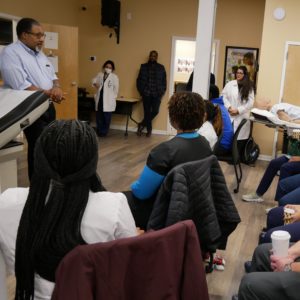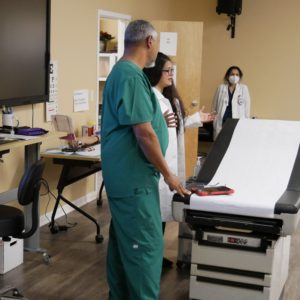[vc_row][vc_column][vc_row_inner][vc_column_inner width=”1/2″][vc_column_text]The White Coat Ceremony at the American University of Integrative Sciences (AUIS), School of Medicine is an event that marks the official entry of newly admitted students into professional training. During the Ceremony, students receive their first white coats from distinguished faculty, a formal confirmation of the students’ commitment to professionalism, excellence, and compassion as they embark on their medical careers. The keynote speaker of the Winter 2018 ceremony was the Dean of Basic Sciences Dr. Alexey Podcheko. We wished to share the content of his inspirational talk about school goals, student and faculty responsibilities and expectations in coming years.[/vc_column_text][/vc_column_inner][vc_column_inner width=”1/2″][vc_single_image image=”44419″ img_size=”full” alignment=”center”][/vc_column_inner][/vc_row_inner][vc_column_text]“Respective students, faculty, distinguished guests, members of administration. I am truly delighted to share this special evening with you all. It is a great honor for me to present this keynote address to all of you. We are very thankful that students who are expecting to get their white coats today choose AUIS in their journey to become medical professionals. Whether you are starting your first semester here or if it is your second or even third year in this medical school, I congratulate you all![/vc_column_text][vc_row_inner][vc_column_inner width=”1/2″][vc_column_text]Over the next several semesters our goal will be to help you become physicians who are knowledgeable, think critically, work hard and effectively, are able to work in the multidisciplinary teams, and who have an aspiration for life-long learning. Based on my calculations, this is 10th White Coat ceremony of AUIS. The first one was held in Sint Maarten in Fall 2014. In September of 2014 American University of Integrative Sciences assumed the charter and legacy of USEOM to assure the continuity of the education for current and future medical students.[/vc_column_text][/vc_column_inner][vc_column_inner width=”1/2″][vc_single_image image=”44420″ img_size=”full” alignment=”center”][/vc_column_inner][/vc_row_inner][/vc_column][/vc_row][vc_row][vc_column][vc_column_text]With a new Board of Directors and Administration, under the guidance of our President Dr. Renu Agnihotri, we began a significant improvement initiative to merge state of the art instruction and technology and develop a more inclusive and unique curriculum which will make us different from other schools. Changing curriculum is never an easy and simple process. Moving to Barbados in the May of last year allowed us to accelerate curriculum reform which we hope will make our school unique and our students stand out and excel in preparation for US or Canadian medical licensing exams.
One of the most important goals in our school reform is to make sure that AUIS curriculum and learning objectives have met the standards of quality medical education set by the American Association of Medical Colleges and Medical Council of Canada. That is why at the end of last year we applied for accreditation as an educational institute via the Barbados Government and in January 2018 we also applied for accreditation at The Caribbean Accreditation Authority for Education in Medicine and other Health Professions (CAAM-HP). Gaining accreditation by CAAM-HP involves a demanding review process that assessed every facet of the AUIS medical program. This year we are expecting a visit from CAAM-HP which we hope will allow us to obtain initial accreditation status. This accreditation is exclusive to medical schools that meet or exceed the highest industry standards which are almost identical to those set up by AAMC in US and Canada.
Along with accreditation process in this year we are also changing our curriculum from subject based to system based. Another important initiative we are implementing in our Syllabus are the Entrustable Professional Activities. AAMC developed a list of 13 Core Entrustable Professional Activities for Entering Residency that all entering residents should be expected to perform on day 1 of residency without direct supervision regardless of specialty choice. Starting from 2017 AAMC strongly advised implementation of this Core EPA framework as a minimum standard of undergraduate medical education in US Medical Schools.
Starting from this year, ahead of many other Caribbean Medical schools, we are including these thirteen (13) core competencies in our Basic Science and Clinical Medicine programs.
- EPA 1: Gather a history and perform a physical examination
- EPA 2: Prioritize a differential diagnosis following a clinical encounter
- EPA 3: Recommend and interpret common diagnostic and screening tests
- EPA 4: Enter and discuss orders and prescriptions
- EPA 5: Document a clinical encounter in the patient record
- EPA 6: Provide an oral presentation of a clinical encounter
- EPA 7: Form clinical questions and retrieve evidence to advance patient care
- EPA 8: Give or receive a patient handover to transition care responsibility
- EPA 9: Collaborate as a member of an interprofessional team
- EPA 10: Recognize a patient requiring urgent or emergent care and initiate evaluation and management
- EPA 11: Obtain informed consent for tests and/or procedures
- EPA 12: Perform general procedures of a physician
- EPA 13: Identify system failures and contribute to a culture of safety and improvement
If our students are able to demonstrate these 13 activities at the end of their study at AUIS we can say that our job was well done as teachers. We have another exciting step which widening opportunities for our students. From the year 2018 our students can graduate by passing Canadian MCQEE exams without completion of STEP2 CK and CS and apply directly to Canadian residency match system. As a developing school we have many challenges but with your help and hard work we can achieve our goal of uniqueness. The white coat you will put on today marks the beginning of this journey. Wherever your medical training takes you, wear your white coat and MD in training title with pride and privilege, but most importantly, with humility.”[/vc_column_text][/vc_column][/vc_row][vc_row][vc_column][vc_masonry_media_grid style=”load-more” btn_align=”center” grid_id=”vc_gid:1544052881997-fb7a6726-902b-6″ include=”44421,44422,44423,44424,44425,44426,44427,44428,44429,44430,44431,44432,44433,44434,44435,44436,44437,44438,44439,44440,44441,44442,44443,44444,44445,44446,44447,44448,44449,44450,44451,44452,44453,44454,44455,44456,44457,44458,44459,44460,44461,44462″][/vc_column][/vc_row]


